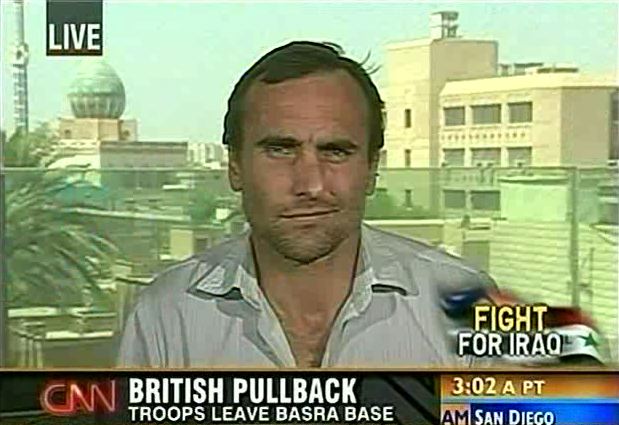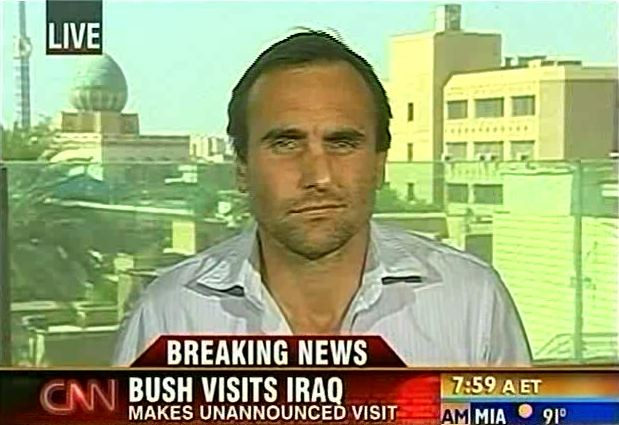AAM: Brits nearly out of Basra; President Bush in Anbar

Length: 2:33
LARGE (29.9 MB) ----- SMALL (2.9 MB)
JOHN ROBERTS: British troops overnight completed their pullback in Basra. Five hundred and fifty soldiers are handing over control to the Iraqis and moving to the last British base near the Basra Airport. The British plan is to turn over all of southern Iraq to the Iraqis in the next few months time. CNN's Michael Ware is live in Baghdad.
And, Michael, does this signify a move that gives Basra effectively back to the Iraqis?
MICHAEL WARE, CNN CORRESPONDENT: Well, John, in many senses, the Brits never had Basra. Indeed, the five provinces in southern Iraq, the oil-rich region of the country that the Brits were supposed to control, really for years now, have actually been under the domination of what U.S. military intelligence calls Iranian-backed Shia militias, political parties and religious movements. So, in essence, while the Iraqi/Shia militias have been attacking the Brits, the Brits have been too busy trying to keep themselves alive to worry about the fact that what the Americans call Iranian proxies have been running the show.
So, John, welcome to a post-American Iraq. This is a vision of what it will be like when U.S. troops draw down.
ROBERTS: Yes, you know, immediately the concern is, what will happen when the British influence is removed from that area. We have seen, in many parts of the country we see Sunni against Shiite. Down there in Basra, we've seen Shiite against Shiite. Is the violence expected to increase as they start to work out a power struggle in the wake of the British pulling out?
WARE: Well, the Brits have had no influence, John. There's already a power struggle. There's already violence in the streets. The police are controlled by one Shia militia faction. The government, controlled by another.
I mean what we're looking at, according to the International Crisis Group, is the British ignominious defeat. And we've seen them, many years ago, surrender real power to these militia factions indeed.
Indeed, they are so strong that the prime minister of Iraq tried to sack the governor of Basra and the governor refused to go. So the prime minister, according to our U.S. sources, ordered his army to remove the governor of Basra. And his army divisional commander down there, said, "sir, I'd like to do that, but I can only rely on about 100 soldiers."
So the Brits haven't had control. It's Iran who has control, according to western diplomats.
ROBERTS: All right. Well, we'll see how that goes in the future.
Our Michael Ware for us live in Baghdad.
Michael, as always, thanks for joining us this morning.

Length: 5:40
LARGE (66.4 MB) ----- SMALL (6.6 MB)
JOHN ROBERTS, CNN ANCHOR: Let's go to our Michael Ware now. He's in Baghdad.
Michael, this is the president's third trip to Baghdad. Any idea where he is, what he'll see on this visit?
MICHAEL WARE, CNN INTERNATIONAL CORRESPONDENT: Absolutely no clue, John. This is very much a cloak-and-dagger-style visit as we've seen in the past from the president, again on holidays. This is obviously Labor Day back home. So, he's come in here -- there's a multitude of reasons that you could fathom.
Clearly, this is on the eve of the all-important reports to flow into Congress and the testimony next week from Ambassador Ryan Crocker here and from the American commander of the war in Iraq, General David Petraeus. It might also be to give the Iraqi government a bit of a nudge, much needed, to try and see if there's any last hope for them to deliver on any of the benchmarks or anything that America wants.
And obviously he'll be keen to sing the praises of the American success in the west with the Sunni, with the tribal program as the military calls it, but, in fact, it's American Sunni militia-building. So, all we know from the U.S. military is that yes, indeed, the president has arrived in Iraq for a surprise Labor Day visit -- John.
ROBERTS: Do you know, Mike, how he arrived? I expect that he would have switched planes and landed on a military transport. Air Force One is not typically the thing you'd want to bring in at Baghdad International.
WARE: To be honest, John, we wouldn't have a clue. And I think that's the way that the military would prefer it. And I dare say that those who do know the mechanisms of the president's visits, including pool reporters, would be restricted from detailing that.
So, honestly, we had no idea that he was coming. We had no idea how he was obviously going to get here. And right now, we have no idea what he's doing or where he's going to go. We'll just have to wait for the military to release it in due course -- John.
ROBERTS: Right.
In terms of what Petraeus is expected to report, Michael, from your reporting on the ground -- and you've been there for four years, if not a little bit longer than that, what would you expect he's going to say in terms of how long U.S. forces need to stay?
WARE: Oh, U.S. forces are going to have to stay for a considerable time, I'm sure the general is going to say. I mean, if the military could, I'm sure it would want to maintain the current troop level of 160,000 in Iraq for some considerable period of time.
Indeed, I would in fact speculate that in a dream world, they would want even more troops, because they still don't have enough boots on the ground here in Iraq to enforce U.S. policy or to protect U.S. interests.
So, indeed, what I would anticipate to hear from the ambassador and the general next week is that whilst there has been some military successes, some pluses and minuses from the so-called surge -- particularly they'll be hailing the triumphant success of what they call the Sunni tribal program, which is, according to the Iraqi government, a militia-building program by the Americans to counter Iranian-Shia militia influence -- they'll say that, despite these successes and putting al Qaeda on the back foot, that politically, this place is still a disaster, and right now there's very little on the horizon to suggest that the political front is going to change at all.
So, this, indeed, I would imagine, is something that they'll say is the time for America to actually act decisively to try and secure what remains of American influence here. But, only time will tell, and we'll find out soon enough next week -- John.
ROBERTS: Michael, the other big story there in Iraq besides the president's impromptu and unannounced visit today is the fact that the British have pulled back out of Basra to the Basra airport. Is that expected to make any difference on the ground at all? And can the Iraqi forces who are now in charge of security there maintain whatever semblance of peace there was? And not that there was a whole lot of it.
WARE: Yeah, well, the short answer to that is, no, there'll be no change, and yes, the Iraqi authorities will be able to maintain what little control there is down there because, to be honest, the Brits have been all but irrelevant in the south for years, possibly, now. The people who own the south are the Shia militias, short and simple.
Forget the rest. It's not the Brits, it's not American influence, it's the militias. The very militias that U.S. military intelligence say are dominated, backed, and militarily supported by Iran.
Now, indeed, what we see is, the south essentially operates as an autonomous region defiant of the so-called Iraqi government that the Americans have built here in Baghdad. Remember, the governor of Basra, the oil-rich city, the province with the most oil in this country, was sacked by the prime minister but refused to go. The prime minister can't even sack his own governor, who is more powerful down there than the prime minister himself is.
Indeed, according to U.S. sources, when the prime minister ordered his general down there to remove the governor, the general responded that he simply couldn't do it because he couldn't rely on the loyalty of more than 100 soldiers or so. So, Iranian-backed militias own the south, have done for a long time, the Brits have been a bit player, and this just consolidates the militia influence that we see both in the south and here in the capital, Baghdad -- John.
ROBERTS: All right.
Michael Ware for us live this morning from Baghdad on the situation in Basra and the president's secret trip -- not so secret now — to Baghdad. Kiran.
